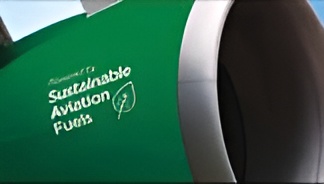
当前位置:新闻动态
Four sustainability executives report on SAF progress
来源:https://www.shippingazette.com/ 编辑:编辑部 发布:2025/04/21 08:50:30
FOUR aviation renewable fuel executives sat down with Bloomberg Professional Services consultant to discuss progress, only to reveal there wasn't much, if any.
Typical was the clarity offered by Charlotte Lollar, director of sustainable aviation fuel, Delta Global Sustainability.
"Sustainable aviation fuel is very expensive. It's also very necessary. When you ask a question about who's responsibility it is, it's kind of the responsibility of all of us.
"There is a necessary step change that has to happen in the technology in order to scale and make it more affordable," she said.
Said Lauren Riley, chief sustainability officer at United Airlines: "We do want to drive the emissions out of our supply chain. We have to focus on permanent reductions and that's why we're so bullish about sustainable aviation fuels.
"They're looking at adding different policies that address sustainability in aviation. Change is happening everywhere. Fundamental to United commitment to net zero by 2050 is that it's anchored in our business strategy," she said.
Said Robert Horton, vice president environmental affairs, Dallas Fort Worth airport. "We've reduced our energy costs by almost 40 per cent and our annual spending on energy by almost 40 per cent. And that's significant because as you reduce the waste, you're also reducing your environmental footprint.
"Sustainable aviation fuel (SAF) is a lot more challenging because airports don't purchase fuel. That's mainly the airlines. But we've done a lot of pilots with used cooking oil, collecting that, and then routing that to recyclers to refine and convert it into sustainable fuels."
Said Adam Klauber, vice president, sustainability, at World Energy: "Even pipelines have emissions. Can we deliver to the nearest airport to our production capacity?"
Mr Klauber's Boston-based World Energy, produces renewable fuels. It operates the world's first SAF production plant in Los Angeles and was the first SAF producer to earn RSB (Roundtable on Sustainable Biomaterials, a classification society) certification.
Said Mr Klauber: "As a business, we have to sell where we get the highest price, however it makes most sense to reduce the logistics costs that's associated. There are emissions there too. That is really what makes sense."

